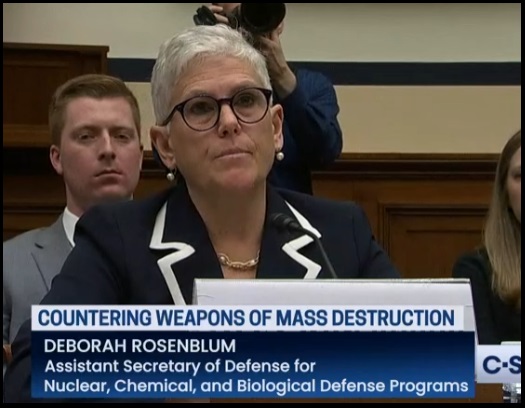Every time the U.S. government attempts to clarify the biolabs in Ukraine, they end up making things less clear.
 In the most recent example, Deborah Rosenbaum, the assistant secretary of defense for nuclear, chemical, and biological defense programs, told the House subcommittee on Intelligence and Special Operations on Friday that “I can say to you unequivocally there are no offensive biologic weapons in the Ukraine laboratories that the United States has been involved with.”
In the most recent example, Deborah Rosenbaum, the assistant secretary of defense for nuclear, chemical, and biological defense programs, told the House subcommittee on Intelligence and Special Operations on Friday that “I can say to you unequivocally there are no offensive biologic weapons in the Ukraine laboratories that the United States has been involved with.”
In a fact sheet produced March 11, 2022, the U.S. Defense Department admitted to working with biological weapons facilities in Ukraine [LINK]. “The United States … has invested approximately $200 million in Ukraine since 2005, supporting 46 Ukrainian laboratories, health facilities, and diagnostic sites.”
As the current story is told the U.S. government was coordinating with the Ukraine government on biologic research facilities, many of which were left over from the former Soviet era. In/around the time the Russian invasion was feared, they worked quickly to destroy the pathogens, because they were worried what might happen if the Russians took control of the facilities.
This begs the obvious first question, if the U.S. Defense Department was working with Ukraine since 2005, and they could destroy the deadly pathogens in a few days before the conflict, why didn’t the Pentagon destroy them in the preceding 16 years?
The second question targets the issues that are more opaque. The DoD says the U.S. has not been involved in “offensive biological weapon” creation in Ukraine. Technically, all of the weapons in the U.S. military are classified as “defensive” weapons, ergo the Department of Defense. Every weapon is defensive until it is used; then, depending on the circumstances, the use of the weapon changes its classification to offensive. Why would biological weapons be any different?
By the current standard of Defense Department definitions, all of the biological weapons they might be working with Ukraine to develop would technically be classified defensive weapons. As a result, saying “there are no offensive biologic weapons” is a rather moot and irrelevant point.
Three points:
♦ Point One – Russia and the U.S. Pentagon both agree the U.S. government was working in Ukraine in biological weapons labs.
♦ Point Two – Both Russia and the U.S. admit these were/are deadly biological pathogens.
♦ Point Three – The biggest difference between the two positions is that Russia says these were offensive weapons, and the U.S/Ukraine saying these were defensive weapons.
The debate is not about whether the U.S. Defense Department was operating and funding biological weapons laboratories in Ukraine. The U.S. government has now made that admission. The debate is now about the purpose or intent of those weapons.
If Russia was investing in biological weapons labs in Mexico, and if the Russian military was working inside those labs along with Mexican government officials, I suspect the United States would conduct a special military operation in Mexico to remove that threat.

